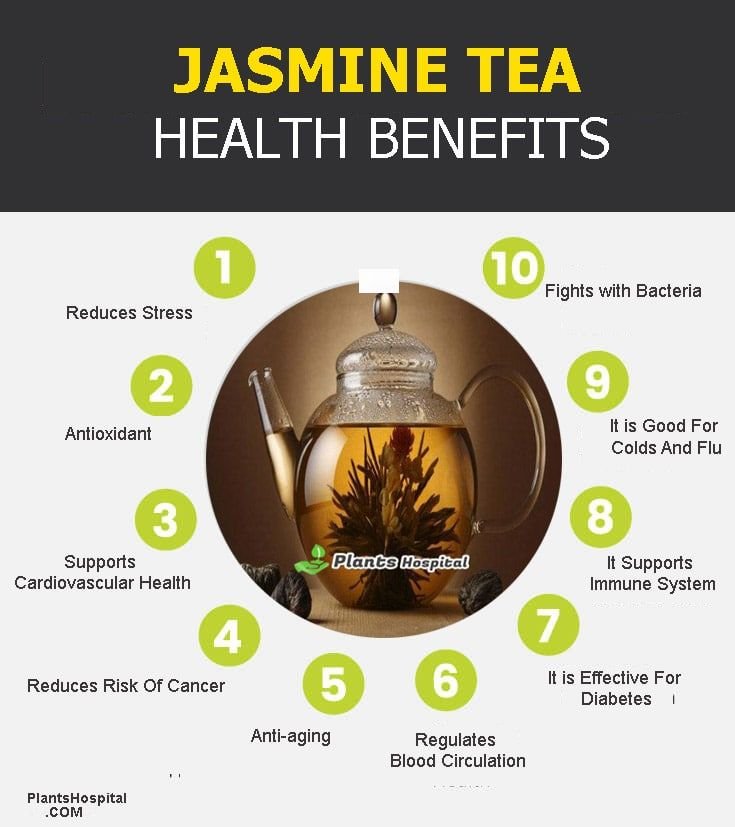One variety of tea that has a subtle floral flavor is jasmine tea, which is flavored with fresh jasmine blossoms. Although white, black, and oolong teas with jasmine scents are also available, jasmine tea typically has a green tea base. We’ll go over the main advantages of jasmine tea, its preparation, and how to make the ideal cup.

Including jasmine tea in your diet is a simple and healthy option. It can be eaten as loose leaves, tea bags, or pearls. One kind of tea that has the perfume of the jasmine plant’s petals is called jasmine tea. Although green tea is usually the foundation, black or white tea can occasionally be substituted. Common jasmine (Jasminum officinale) or sampaguita (Jasminum sambac) blossoms are combined with stored tea. It is placed next to the tea leaves to infuse the aroma. Because jasmine tea is often produced from green tea leaves, it gives many of the same great health advantages. These benefits you would get from drinking green tea. In this article, we’re going to talk about Jasmine tea health benefits.
Health benefits of jasmine tea:
Jasmine tea has several advantages, such as promoting calmness, enhancing mental clarity, and strengthening the immune system. The benefits of jasmine tea come from the camellia sinensis tea base as well as the aroma of the fragrant jasmine blossoms. Black tea, green tea, and white tea each have special advantages.
- Antioxidant Contents: The antioxidants in jasmine tea aid in the body’s defense against free radicals and the reduction of oxidative stress.
- Stress relief: Jasmine tea’s scent is well-known for its relaxing qualities, which can aid in lowering tension and anxiety.
- Good for Heart health: Because jasmine tea has the ability to decrease cholesterol, regular use may help to enhance heart health.
- Best in Digestive help: Jasmine tea is a fantastic choice after meals as it is thought to ease stomach discomfort and aid with digestion.
- Support for the immune system: Jasmine tea’s antioxidants may help fortify the immune system and hence it shields the body from illnesses.
- Helps in Weight Management: Research indicates that drinking jasmine tea could increase metabolism and help with weight loss.
- Benefits for the skin: Jasmine tea’s antioxidants may help maintain good skin and stave off skin aging.
- Best Choice for Dental health: Tooth decay and dental health maintenance may be aided by the antibacterial qualities of jasmine tea.
- Anti-inflammatory contents: Jasmine tea might be beneficial for illnesses linked to inflammation because of its possible anti-inflammatory qualities.
- Mental alertness: The caffeine in jasmine tea helps enhance focus and mental sharpness.
- Lowers the risk of Parkinson’s disease: Jasmine tea contains contents that are useful in protecting humans from various diseases like PD AZ.
The process of making jasmine tea:
Premium jasmine teas are solely scented with fresh jasmine blooms, which gives the tea a floral scent. Some jasmine teas are prepared by mixing jasmine flowers with loose leaf tea. Known for their exceptional fragrance, jasmine teas are frequently of very high quality.
The tea is held until the jasmine flowers bloom, which is typically in the middle to late summer, after it has been gathered and processed in the spring and early summer. Overnight, when the jasmine blossoms are at their most fragrant, a tray of jasmine blooms is placed beneath a tray of tea leaves to fragrance the best jasmine teas. Throughout the scenting process, the blooms will frequently be switched out multiple times. The tea is dried and packed after it has been perfumed.
Another way to add fragrance to jasmine tea is to mix jasmine blooms straight into loose leaf tea and then strain the jasmine blossoms out of the tea. Although a perfumed floral tea is also produced in this way, tea produced in this way is typically regarded as being of lower quality.
The history of jasmine tea:
The Chinese city of Fuzhou is closely linked to jasmine tea. During the Han period, jasmine was brought to China, and shortly after, it was employed to flavor tea. The jasmine blossom has religious and cultural importance throughout Asia and is regarded as one of the sacred flowers in Buddhism. The Gongfu tea ceremony, a meditative preparatory ritual, and the therapeutic benefits of jasmine tea are very closely related.
Is there caffeine in jasmine tea?
In a nutshell, the majority of jasmine teas contain caffeine. However, the type of tea used as the foundation affects how much caffeine these teas contain. While black tea has around half as much caffeine as a cup of coffee, white tea typically has less, green tea has a reasonable quantity, and black tea has a reasonably high amount. However, it can be challenging to estimate or forecast the exact amount of caffeine that will be in a brewed cup of tea, even within specific tea categories. A number of factors affect caffeine levels, including:
- Tea variety: Teas made from the Camellia sinensis var. assamica variety, such as Vanilla Velvet, typically contain more caffeine than teas made from the Camellia sinensis var. sinensis variety, such as Jasmine Silver Needle or Jasmine Yin Cloud.
- When the leaves are picked: Silver tips teas and other leaves picked in the spring typically have more caffeine than teas picked later in the year. One excellent example of a silver tip tea that has more caffeine than many other white teas is Jasmine Silver Needle.
- How the leaves are processed: Some teas’ caffeine content is also impacted by processing. Teas made from whole leaves with little processing could have a little less caffeine than tea made from broken or chopped leaves.
